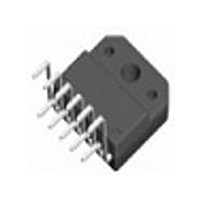LM3886TF National Semiconductor, LM3886TF Datasheet - Page 8

LM3886TF
Manufacturer Part Number
LM3886TF
Description
92F299
Manufacturer
National Semiconductor
Datasheet
1.LM3886TF.pdf
(24 pages)
Specifications of LM3886TF
Operational Class
Class-AB
Audio Amplifier Output Configuration
1-Channel Mono
Output Power (typ)
68x1@4OhmW
Audio Amplifier Function
Speaker
Input Offset Voltage
10@±28VmV
Input Bias Current
1uA
Total Harmonic Distortion
0.03@4Ohm@60W%
Single Supply Voltage (typ)
18V
Dual Supply Voltage (typ)
±12/±15/±18/±24V
Power Supply Requirement
Single/Dual
Power Dissipation
125W
Unity Gain Bandwidth Product (typ)
8MHz
Rail/rail I/o Type
No
Power Supply Rejection Ratio
120dB
Single Supply Voltage (min)
20V
Single Supply Voltage (max)
84V
Dual Supply Voltage (min)
±10V
Dual Supply Voltage (max)
±42V
Operating Temp Range
-20C to 85C
Operating Temperature Classification
Commercial
Mounting
Through Hole
Pin Count
11 +Tab
Package Type
TO-220
Amplifier Class
AB
No. Of Channels
1
Output Power
68W
Supply Voltage Range
20V To 84V
Load Impedance
4ohm
Operating Temperature Range
-20°C To +85°C
Amplifier Case Style
TO-220
Rohs Compliant
No
Lead Free Status / RoHS Status
Not Compliant
Available stocks
Company
Part Number
Manufacturer
Quantity
Price
Part Number:
LM3886TF
Manufacturer:
CN/如韵
Quantity:
20 000
Company:
Part Number:
LM3886TF/NOPB
Manufacturer:
AVX
Quantity:
40 000
Part Number:
LM3886TF/NOPB
Manufacturer:
TI/德州仪器
Quantity:
20 000
www.national.com
1.
2.
3.
4.
5.
6.
7.
8.
9.
10.
11.
12.
13.
14.
15.
16.
17.
18.
19.
External Components Description
(Figure 1 and Figure 2)
Note 17: Optional components dependent upon specific design requirements. Refer to the Application Information section for more information.
OPTIONAL EXTERNAL COMPONENT INTERACTION
Although the optional external components have specific
desired functions that are designed to reduce the bandwidth
and eliminate unwanted high frequency oscillations they may
cause certain undesirable effects when they interact. Inter-
action may occur for components whose reactances are in
close proximity to one another. One example would be the
coupling capacitor, C
Components
R
R
C
C
R
C
(Note 17)
Ri
Ci
(Note 17)
R
R
(Note 17)
C
(Note 17)
R
C
R
(Note 17)
C
(Note 17)
L
(Note 17)
R
(Note 17)
C
S1
IN
A
A
B
C
f1
f2
f
M
M
SN
SN
S
Acts as a volume control by setting the voltage level allowed to the amplifier’s input terminals.
Provides DC voltage biasing for the single supply operation and bias current for the positive input terminal.
Provides bias filtering.
Provides AC coupling at the input and output of the amplifier for single supply operation.
Prevents currents from entering the amplifier’s non-inverting input which may be passed through to the load
upon power-down of the system due to the low input impedance of the circuitry when the under-voltage
circuitry is off. This phenomenon occurs when the supply voltages are below 1.5V.
Reduces the gain (bandwidth of the amplifier) at high frequencies to avoid quasi-saturation oscillations of the
output transistor. The capacitor also suppresses external electromagnetic switching noise created from
fluorescent lamps.
Inverting input resistance to provide AC Gain in conjunction with R
Feedback capacitor. Ensures unity gain at DC. Also a low frequency pole (highpass roll-off) at:
f
Feedback resistance to provide AC Gain in conjunction with Ri.
At higher frequencies feedback resistance works with C
Ri. A high frequency pole (lowpass roll-off) exists at:
Compensation capacitor that works with R
Mute resistance set up to allow 0.5 mA to be drawn from pin 8 to turn the muting function off.
Mute Current curves in the Typical Performance Characteristics section.
Mute capacitance set up to create a large time constant for turn-on and turn-off muting.
Works with C
Works with R
Provides high impedance at high frequencies so that R may decouple a highly capacitive load and reduce the
Q of the series resonant circuit due to capacitive load. Also provides a low impedance at low frequencies to
short out R and pass audio signals to the load.
Provides power supply filtering and bypassing.
Mute switch that mutes the music going into the amplifier when opened.
c
= 1/(2πRi Ci)
f
f
→ R
c
c
C
, and the compensation capacitor, C
= [R
= 1/(2πR
M
is calculated using: R
f1
R
f2
SN
SN
SN
(s + 1/R
C
to stabilize the output stage by creating a pole that eliminates high frequency oscillations.
to stabilize the output stage by creating a pole that eliminates high frequency oscillations.
SN
)
f2
C
f
)]/[(R
M
f1
≤ (|V
+ R
EE
f2
)(s + 1/C
| − 2.6V)/I8 where I8 ≥ 0.5 mA. Refer to the Mute Attenuation vs.
f
.
f1
Functional Description
and R
8
f
(R
These two components act as low impedances to certain
frequencies which will couple signals from the input to the
output. Please take careful note of basic amplifier compo-
nent functionality when designing in these components.
The optional external components shown in Figure 2 and
described above are applicable in both single and split volt-
age supply configurations.
f1
f2
+ R
to reduce the AC Gain at higher frequencies.
f
f2
to provide lower AC Gain in conjunction with R
))]
f1
.
f1
and












